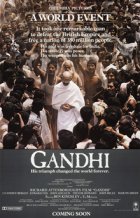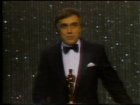
Gandhi
- PG
- Year:
- 1982
- 191 min
- 1,856 Views
EXTERIOR - SKY - DAY
The camera is moving toward an Indian city. We are high and
far away, only the sound of the wind as we grow nearer and
nearer, and through the passing clouds these words appear:
"No man's life can be encompassed in one telling. There is
no way to give each year its allotted weight, to include
each event, each person who helped to shape a lifetime. What
can be done is to be faithful in spirit to the record, and
to try to find one's way to the heart of the man..."
And now we are approaching the city, the squalor of the little
shanty dwellings around the outskirts, the shadows of large
factories... And as we move nearer, coursing over the parched
terrain, the tiny fields of cultivation, strands of sound
are woven through the main titles, borne on the wind, images
from the life we are seeking:
British:
"Who the hell is he?!", lower class British: "Idon't know, sir."... "My name is Gandhi. Mohandas K.
Gandhi."... A woman's voice, tender, soft: "You are my best
friend, my highest guru... and my sovereign lord."... A man
(Gandhi):
"I am asking you to fight!"... An angry aristocraticEnglish voice:
"At home children are writing 'essays' abouthim!"... the sound of massed rifle fire, screams...
EXTERIOR - CITY - DAY
And now we are over the city, coming in toward a particular
street in the affluent suburbs of New Delhi... there are a
few cars (it is 1948), and we are closing on a milling crowd
near the entrance to one of the larger homes.
We see saris, Indian tunics, a sprinkling of "Gandhi" caps,
several tongas (two-wheeled, horse-drawn taxis)... the shreds
of sound continue -- American woman, flirtatious, intimate:
"You're the only man I know who makes his own clothes."
Gandhi's laugh... The sound of rioting, women's cries and
screams of terror... An American voice: "This man of peace"...
And as the titles end we begin to pick up the sounds of the
street... an Australian and his wife, a BBC correspondent...
all in passing, as the camera finally closes and holds on
one young man:
Godse.Godse steps from a tonga as the crowd begins to move toward
an entrance-way at the back of a long wall.
HOUSE SERVANT'S VOICE
He will be saying prayers in the
garden -- just follow the others.
In contrast to those about him, there is tension in Godse's
face, an air of danger in his movements.
He glances at two policemen who are talking casually, absorbed
in their own gossip -- then he looks back at another tonga
that pulls up just behind his. Two young men (Apte and
Karkare) meet Godse's gaze, and again we get the sense of
imminent danger.
They descend and pay their driver absently, their eyes
watching the crowd.
Sitting along in the shadows of a stationary tonga a little
distance down the street an elderly man (Prakash) with a
short, close-cropped beard and the taut, sunken flesh of a
cadaver is watching...
Apte and Karkare look back at him. There is just the slightest
acknowledgment and then Prakash lifts his eyes to the gate,
as though to tell them to be about their business.
THE GATE AT BIRLA HOUSE - EXTERIOR - DAY
Godse hesitates before approaching the two gardeners who
nonchalantly flank the entrance. He stiffens himself,
cautiously touches something under his khaki jacket, then
glances back at the stoic face of Prakash. Prakash's gaze is
as firm and unrelenting as a death's head. Godse turns back,
wetting his lips nervously, then moves into the middle of a
group going through the gate.
GARDEN - BIRLA HOUSE - EXTERIOR - TWILIGHT
A fairly numerous crowd is gathering here, informally filling
the area on one side of a walk that leads to a little pavilion --
some devout, some curious, some just eager to be near the
great man.
Godse moves forward through them toward the front just as
hushed voices begin to remark -- "I see him." "Here he comes!"
"Which one is Manu?"...
Apte and Karkare move to different sides of Godse, staying a
little behind, their movements sly and wary, aware of people
watching.
Featuring Gandhi. We see him distantly through the crowd.
The brown, wiry figure cloaked only in loincloth and shawl,
still weak from his last fast and moving without his customary
spring and energy as he is supported by his two grand nieces,
his "walking sticks," Manu and Abha.
We do not see him clearly until the very last moment -- only
glimpses of him as he smiles, and exchanges little jokes
with some of the crowd and the two young women who support
him, occasionally joining his hands together in greeting to
someone in particular, then once more proceeding with a hand
on the shoulder of each of the girls.
The camera keeps moving closer, and the point of view is
always Godse's, but Gandhi is always in profile or half
obscured by the heads and shoulders of those in front. We
hear the occasional click of a camera, and we intercut with
shots of Godse moving tensely up through the crowd, of Apte
and Karkare on the periphery of the crowd, watching with
sudden fear and apprehension, like men paralysed by the
presence of danger.
Featuring Godse. He slides through to the very front rank.
His breathing is short and there is perspiration around the
sides of his temples. And now, for an instant we see Gandhi
close from his point of view. He is only a few steps away,
but turned to speak to someone on the other side, and Manu
half obscures him.
Translation
Translate and read this script in other languages:
Select another language:
- - Select -
- 简体中文 (Chinese - Simplified)
- 繁體中文 (Chinese - Traditional)
- Español (Spanish)
- Esperanto (Esperanto)
- 日本語 (Japanese)
- Português (Portuguese)
- Deutsch (German)
- العربية (Arabic)
- Français (French)
- Русский (Russian)
- ಕನ್ನಡ (Kannada)
- 한국어 (Korean)
- עברית (Hebrew)
- Gaeilge (Irish)
- Українська (Ukrainian)
- اردو (Urdu)
- Magyar (Hungarian)
- मानक हिन्दी (Hindi)
- Indonesia (Indonesian)
- Italiano (Italian)
- தமிழ் (Tamil)
- Türkçe (Turkish)
- తెలుగు (Telugu)
- ภาษาไทย (Thai)
- Tiếng Việt (Vietnamese)
- Čeština (Czech)
- Polski (Polish)
- Bahasa Indonesia (Indonesian)
- Românește (Romanian)
- Nederlands (Dutch)
- Ελληνικά (Greek)
- Latinum (Latin)
- Svenska (Swedish)
- Dansk (Danish)
- Suomi (Finnish)
- فارسی (Persian)
- ייִדיש (Yiddish)
- հայերեն (Armenian)
- Norsk (Norwegian)
- English (English)
Citation
Use the citation below to add this screenplay to your bibliography:
Style:MLAChicagoAPA
"Gandhi" Scripts.com. STANDS4 LLC, 2025. Web. 21 Feb. 2025. <https://www.scripts.com/script/gandhi_471>.







Discuss this script with the community:
Report Comment
We're doing our best to make sure our content is useful, accurate and safe.
If by any chance you spot an inappropriate comment while navigating through our website please use this form to let us know, and we'll take care of it shortly.
Attachment
You need to be logged in to favorite.
Log In